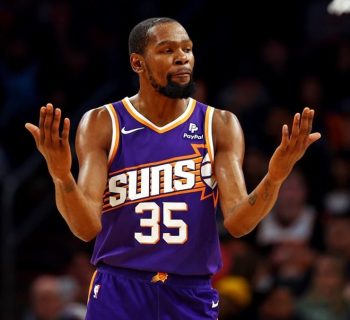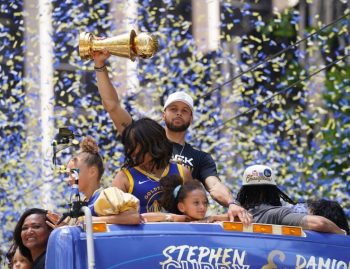NBA
NBA Sunday: Westbrook Easy Choice for MVP

With a mere 20 games to go in the regular season, Russell Westbrook remains on the verge of doing the impossible. Having amassed a total of 30 triple-doubles on the season, Westbrook has turned in the third-most triple-doubles in a single season in NBA history, trailing only Wilt Chamberlain (who amassed 31 triple-doubles in the 1967-68 season) and Oscar Robertson, whose 41 triple-doubles accumulated during the 1961-62 season remains the all-time record.
Sure, Westbrook is the contemporary NBA’s unquestioned king of the triple-double, but is he the league’s Most Valuable Player?
In a word: Yes.
* * * * * *
As the 2016-17 NBA season winds down, with all due respect to LeBron James and Isaiah Thomas, the race for the league’s Most Valuable Player Award is one between two horses—Westbrook and James Harden. Harden has turned in an absolutely remarkable season that has seen his Houston Rockets make an improbable rise to the third seed in the Western Conference. Without question, he warrants serious consideration.
Without Harden and his mind-numbing per-game averages of 28.8 points, 8.0 rebounds and 11.3 assists, the Rockets would probably be a lottery team. But the debate as to whether or not Harden or Westbrook ends up winning the MVP Award will boil down to two questions.
The first is to what extent people (especially the voters) give reverence to history, while the second is whether or not the league’s decision to make the voting results public was actually in the best interest in the integrity of the awards processes. The latter may end up having unintended consequences. Consider the latter first.
Last season, en route to helping to lead the Golden State Warriors to a record-breaking 73 regular season wins, Stephen Curry became the first unanimous MVP in NBA history. To that point, there had never been a unanimous MVP, and that’s noteworthy, to say the least. That Curry was able to do something that all-time greats including Kareem Abdul-Jabbar, Michael Jordan, Karl Malone, Shaquille O’Neal and Tim Duncan wasn’t was head-scratching to a great many. To understand how this happened, though, one would need to understand the voting process and the psychology that goes into casting a vote.
Back in 2013, as a member of the Miami HEAT, LeBron James won his fourth MVP Award in five seasons. The HEAT was defending NBA Champions and had just turned in a 66-16 regular season. James shot 56.5 percent from the field for the season—a career-best at the time. With 26.8 points, 8.0 rebounds and 7.3 assists per game, in leading the HEAT to the league’s best regular season record, James appeared to be a shoe-in for the MVP Award. He was the obvious choice.
For most people, anyway.
When the NBA released the results of the MVP vote, it was revealed that James received 120 of the 121 first-place votes, meaning that one voter stood between him and his earning the honor of being the first unanimous winner in history. There was an immediate outcry from the voting and non-voting media, as everyone questioned how another member of the media could vote for anyone other than James. Without much suspense, Gary Washburn—a veteran and well-respected journalist who covers the NBA and the Boston Celtics for the Boston Globe—publicly explained why he voted for Carmelo Anthony. Washburn’s decision got so much attention that he was invited to ESPN’s Sports Center to explain his decision, which he did.
In short, Washburn explained that his voting for Anthony was simply because Anthony had taken the Knicks to new heights. He correctly pointed out that the franchise had been a laughingstock over the previous 10 years.
“I just felt like he was the Most Valuable Player, obviously, on his team and to his team,” Washburn said at the time. “If this was a best player of the league award, LeBron James wins this every year, we know that.”
Washburn’s voting for Anthony was absolutely defensible and extremely reasonable. Under no obligation to do so, Washburn also deserves credit for publicly coming out as the lone voter who didn’t select James as his first candidate for MVP. Despite being well-reasoned and informed, though, Washburn probably knew that once he revealed himself as the lone holdout, he was going to be second-guessed for his decision.
Perhaps it was only a coincidence, but the very next season, the NBA had decided that it would make the end-of-season ballots public. The decision was in line with Adam Silver’s declaration to have a league whose inner-workings were more transparent, but now, instead of having the decision to out themselves (or not), all voting members would potentially face the same scrutiny and second-guessing as Washburn.
While making the voting results public would certainly dissuade someone from casting an indefensible token vote for a player with whom they have a relationship (this has happened many times in the past), the unintended consequence could be that voters will subscribe to a herd mentality.
In all seriousness, with the knowledge that their vote would be made public, which member of the media would have wanted to take the risk of voting for anyone other than Stephen Curry last season? Would other members of the media want to face the same second-guessing and scrutiny as Washburn? Of course, there’s no guarantee that a public ballot would dissuade someone from casting a vote they felt strongly about—especially if the vote were cast in good faith. The only question is whether or not a public ballot makes it more likely that a voter will fall in line with their peers out of a want to avoid ridicule.
Simple human nature suggests that it could.
* * * * * *
In a perfect world, Westbrook and Harden would become the first co-MVPs in NBA league history, but it’s not likely to happen.
As fans of the game, ask yourself an important question: Why do you watch?
Some watch because they’re bored, while others watch because they like to witness competition. A great many others watch (and continue to watch) because they like to see history made.
If the Warriors didn’t win 73 games last season, Curry would not have been the unanimous MVP. He would have still won the award, but there would have been at least a few voting members that would have opted to go elsewhere. That’s because a great many that watch the game do so because of their want to witness and be apart of history. A great many watch the game because they want to see Reggie Miller score eight points in nine seconds or Tracy McGrady score 13 points in 33.
Many watch because they want to see LeBron James score 45 points in a do-or-die Game 6 against the Boston Celtics. Many watch because they want to see Kobe Bryant score 60 points in the final game of his career, or Kyrie Irving make one of the biggest three-point shots in history.
And best believe, many are watching this season because they want to see Russell Westbrook accomplish something that hasn’t been done in nearly 60 years.
With only 20 games remaining in the 2016-17 NBA season, Westbrook needs 157 rebounds and 192 assists to finish the season with per-game averages of 10 rebounds and 10 assists. In other words, over his final 20 games of the season, Westbrook needs to average 7.9 rebounds per game and 9.6 assists per game to accomplish the feat.
If he does so and the Thunder manage to win somewhere between 45 and 50 games, it’d be wise to bet on him winning the NBA’s 2017 MVP Award. From Kevin Durant leaving to his decision to remain in Oklahoma City to accomplishing the unthinkable, the reasons to vote for Westbrook are a bit too numerous to ignore.
It’s no fault of Harden; there’s just a great many that watch the game because they want to see history made. And Westbrook is on the cusp of delivering it.
If he does, in the eyes of many, not voting for him becomes borderline indefensible.
Don’t hate the player, hate the game. Or, if you wish, hate the combination of a reverence for history and the league’s decision to go to an open ballot.













